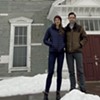Published December 19, 2001 at 4:00 a.m.
The teacher gives a perfunctory, perky-eyed glance around the room, chin thrust upward like a prairie dog peering across the tops of these drooping heads: the Jewish kid in the yarmulke, the kinky-haired midriff exhibitionist, the guy with the shaved head and his own name — KEVIN — tattooed on his arm, in case he forgets it.
“Any more questions for Officer Munson?” the teacher asks. “Any questions at all about the role of the police department in our community?”
Estelle? Is the teacher Estelle? Elizabeth? Isabelle? The names are all starting to blend together.
“Well, then…” she chirps and turns her prairie-dog eyes to me, “we thank you very much for coming, officer.”
The class applauds politely, even the husky dude in the Johns Hopkins Lacrosse sweatshirt, who’s been sneering at me since I walked into the room — and rightfully so. I busted him and his buddies with a keg down at the fishing access just last weekend. I never forget a face. Evidently, neither does he.
As I cross the lot to my cruiser, my eyes drift over the soccer field, now covered with snow, and to the wooden backstop against the trees lining the school property. The soccer team sometimes used that backstop for practice during my years here at South Burlington High School, but during the school day it functioned mainly as a place to go for a smoke, to get high or whatever. The world’s greatest architects couldn’t have designed a better site for juvenile delinquency, since the woods side is completely hidden from view.
I’ve been giving this talk at SBHS at least once a year for the past 12 years, since right after I graduated the police academy. But every single time I return to my vehicle afterwards, I remember the very first talk — and the call I responded to later that day, and a girl who probably spent too much time behind that backstop, and why I’ll keep giving these talks as long as the school keeps inviting me.
The call was for a domestic disturbance, which is never any fun, especially around the holidays. So I was glad to discover, when I pulled alongside the curb in front of 45 Lowry Court, up by the airport, that the parties involved were not a combative couple but a combative mother and son.
A squat, roundish man in green work pants and a black T-shirt came out of the house next door and gestured to the roof of his neighbor’s single-story residence. “There you go,” he muttered. I assumed he’d made the complaint.
Daylight was fading fast, and when I looked up I spotted a boy in blue jeans and a brown, hooded parka sitting crouched in a ball. All coiled up like that, he wasn’t much bigger than the furnace chimney. It was a pretty cold night — colder, I imagined, sitting on snowy roof tiles. Must be one stubborn kid, I thought.
“How’s it going?” I called to him.
The hood rotated vaguely in my direction, but the kid said nothing.
“I’ll tell you how it’s going,” a woman hissed as she shot out the front door. “It’s not going, that’s how it’s going.”
She wore a waist-length leather jacket and a plaid wool skirt that reached the top of her shins. Her thick, red-brown hair was crammed inside a Boston Bruins toque that must’ve been the boy’s. In her frantic state, she gave the impression of having come straight to this disagreement from work, with no break in between.
“Evening,” I said. “I’m Patrolman Tom Munson.”
“He’s been up there for two hours now,” the woman huffed, jabbing once at the roof then jamming her hands in her jacket pockets. “And I can’t seem to do a damn thing to get him to come down.”
The woman’s deep, husky voice suggested days full of cigarettes and heated arguments.
I glanced at the empty driveway behind us, then did a quick scan of the house, figuring she and the kid were living there alone. I decided not to bother asking about a husband or boyfriend.
“Any idea what made him go up there?” I said and removed the notepad from my jacket pocket, just to show the woman someone was planning to do something to help her out. Her nerves were clearly shot.
She sighed and held a hand to her forehead, as if suddenly stricken with a migraine. “Oh, something having to do with a videogame.”
“Nintendo!” the Hood announced in a squeaky pistol-shot of a voice. He turned in our direction and stared us down as a departing jet swallowed us all in thunder.
The woman stared back, her eyes narrowing fiercely behind rings of blurred mascara. She began to speak — I could almost hear the words rumbling in the depths of her throat — but she hesitated. After the jet had passed, her hard look softened. “Oh, come on, Brad,” she pleaded. “I told you I just can’t, not this year.”
The Hood turned away again.
The woman shook her head and yanked a pack of cigarettes from a jacket pocket. She offered me one, but I declined.
“Your turn,” she said with a laugh as she took a long drag and gazed down the street.
As I was turning back to the Hood, I was distracted by the woman’s profile — the sharp line of her jaw — and the way the dusky light made little clouds of her eyes. When she raised her left hand to bite a fingernail, I recognized her without a doubt.
“Penny Bessette?” I said.
She looked at me but remained expressionless, as if I were merely confirming her name for my report. “That’s correct,” she said.
“From South Burlington High School?”
Penny nodded and took another drag. “I went there.”
“We were in the same English class,” I said. “Mrs. Vail. Fresh-man year.”
Penny shrugged. “Could be.” She opened a hand and let the night’s first snowflakes fall into her palm. “I started out there, then I moved.”
“Where’d you move to?” I asked.
Penny’s vacant eyes hardened into that glare she’d given the Hood a few moments earlier. She closed her palm and strained a polite smile. “And just what does this have to do with getting my kid off the roof, officer?”
She didn’t remember me. Didn’t remember anything about me. Hardly seemed to remember taking English, much less being in my class. Humiliated and, I’ll admit, a touch hurt, I stepped into the small front yard. I stopped when the Hood and I were more or less face-to-face, except that he was about 15 feet up in the air.
“Is that what this is all about?” I said. “A videogame?”
The Hood ignored me.
That hurt, too, but I figured it was part of negotiating with a hostile party. “Don’t you think it’s being kind of hard on your mom to stay up there, where she can’t talk to you?”
“Ha!” Penny snorted and flicked her cigarette into the street. “Since when does he care what I think? All he knows is the mean old witch isn’t giving him Nintendo this Christmas. Better call SRS. This is a clear case of neglect.”
At this, Penny spun around and headed back inside. “He’s 10, in case that matters,” she grumbled before slamming the door.
“You see?” I said a few moments later. “She’s pretty upset by this.”
“I’m upset too,” the kid said. He kicked a ragged corner of tile until it came loose and skittered down onto the snowy yard.
I stared at the little fleck of black tile against the white and wondered two things: One, why I was never taught anything at the academy about dealing with kids on roofs. And two, what this particular kid might think if I told him his very own mother might’ve had something to do with my becoming a cop in the first place.
Penny Bessette always sat in the front row of Mrs. Vail’s class — not because she was studious, but because she always arrived late. This gave me, an actively unmotivated student who arrived early to secure a seat in the back row, a chance to appreciate fully the spectacle, the phenomenon, that was Penny.
To be honest, she scared me. For starters, she appeared much older than the rest of us. She wore a lot of makeup, carried a purse, and, walking down the hall, jangled what I assumed were car keys. Because I was born in late November, I was 13 at the start of my freshman year. Penny Bessette drove herself to school.
The fact that she was unpopular only added to her menacing mystique. In her very adult outfits — loop earrings, tight-fitting ribbed turtlenecks, short skirts cinched with wide, sash-like belts, dark stockings and knee-high leather boots — she conveyed the air of being over and done with whatever was trendy at the moment.
Her walk was a woman’s walk, fully involving the hips, that not all her female peers had yet discovered, and she never lingered anywhere, talking to anyone, for more than a few seconds. I would not have been surprised to discover that she’d returned to high school after a brief but unsuccessful marriage to a dangerous man.
My mother still bought my underwear for me.
My last vivid memory of Penny was of an oral book report I gave on The Outsiders, by S.E. Hinton. A lot of my classmates and I had been forced to read the book in middle school, as Ms. Vail tactfully noted when I informed her of my topic. But that didn’t deter me from selecting the title for my presentation. I really liked that book, despite having been made to read it the previous year. It was maybe the first book I’d ever liked.
And so, in an act of defiance uncharacteristic of me at age 13, I eschewed Mrs. Vail’s suggestions for alternate topics, and my own knowledge that I’d be spewing old news to my classmates, and took the lectern, The Outsiders and a page of notes in hand.
Packed into her usual front-row seat, Penny was, I believe, filing her fingernails as I addressed the group. I began with the standard biographical notes on the author: “Born Susan Eloise Hinton in Tulsa, Okla-homa, in 1949, she published The Outsiders in 1967.” I followed with a brief plot summary introducing the central characters and conflicts: “Class warfare between the poor, streetwise greasers and the wealthy, snobby Socs — and a desperate act involving our protagonist, Ponyboy, that brings this conflict to a violent boil.”
But then something strange happened: I felt like I’d blacked out. I would later remember a warm sensation in my limbs and chest, almost as if I were equipped with a heater like one finds in a car, and it had just kicked in. A placid smile cut across my pudgy face as I dove headlong into the deeper, more complex socioeconomic realities illuminated by this provocative text. I may have used those very words. I can’t recall for certain.
What I was sure of, though, was that I knew what I was talking about. I knew what this book meant — on many levels. I understood the role that economics played in the stratification of society, why gangs became like surrogate families for children without solid role-models at home, why people judged others by the way they dressed, talked, carried themselves — in short, why good people just couldn’t seem to get along. And maybe, just maybe, what people could do to bridge their differences.
I think I covered each of these points thoroughly — perhaps too thoroughly, for images of my peers’ nodding heads, glazed eyes, even a yawning Mrs. Vail periodically flashed in my mind’s eye. But I continued without hesitation, propelled by additional insights pelting me like so many literary dodgeballs as I strode back and forth in front of the class.
At last, I reached my concluding point: “As Ponyboy says on that fateful night he meets Soc sweetheart Cherry Valance, ‘Maybe the two different worlds we lived in weren’t so different. We saw the same sunset.’ And maybe…” I gripped the lectern and lowered my head to emphasize the gravity of the point, “…if we could all just remember that kernel of wisdom with each new sunrise…” I tilted my chin toward the tubes of fluorescent light overhead, “…we might live in harmony right here in our own community.”
I lowered my eyes to meet Mrs. Vail’s, which were watering as she struggled to suppress a yawn seemingly twice the size of her jaw.
The room was silent. The back of my neck tingled with the eerie sensation that I’d just been transported back from another dimension. Thinking back on the presentation I’d just given, I couldn’t remember a single word. It was as if I hadn’t yet begun.
But I knew I’d said something, and that it had gone well, because my mouth was dry, my chest warm with exhilarated surges of blood. I scanned the rows but met only blank stares, sleeping faces, yet another yawn from my teacher. I realized then that wherever I’d been for the last, what, five minutes, five hours, five days, I’d been alone. The mind-tour had been a solo mission.
Just before I gathered my notes, I caught Penny Bessette’s heavily mascaraed eyes. She shook her head lightly, her firecracker-red lips parted wide. The fluorescent light ignited her cloudy blue eyes in a way that made it impossible for me to look away.
She let out a clipped, faint moan on a puff of breath.
The back of my neck tingled again.
“That was wonderful, Tom Munson,” she said in her deep, husky voice. “Simply wonderful.”
This time, I was completely alone on my journey into the past. Penny Bessette wasn’t interested in what I’d been doing since high school. How could she be, if she didn’t even remember we’d gone to school together? Anyway, she’d disappeared from our school shortly after my Outsiders book report.
Still, that didn’t lessen the place she held in my memory or the impact she’d had on my life. I never dreaded public speaking after that, although I never again entered that special realm, that other dimension of pure understanding Penny and I had shared that day.
Maybe most important of all, I respected the lessons of The Outsiders. It became more than a book to me. It was the first story I’d ever seen myself in, the class schisms in South Burlington suddenly brought into switchblade-sharp focus. From that point on, I wanted to be a part of that story — a positive part — wherever I saw it playing out in my community.
In the gathering darkness, I could see Penny’s silhouette in the living-room window. She was smoking and chewing a fingernail.
I could’ve done a number of things then: written her a citation for disturbing the peace, written her a warning for disturbing the peace, called the fire department for a ladder, or nothing at all.
Instead, I took a few steps further into the yard, out of view from the living room, and unsnapped my handcuffs.
The Hood turned in my direction.
I pulled the cuffs off my belt, making sure they jangled in the night.
The Hood pulled his hood back to get a better view.
“Here’s the deal, Brad,” I said with the firmness of a final offer. “You come down here, and I’ll cuff you.”
“What?”
“Yeah. I’ll cuff you and put you in the cruiser. Then I’ll tell your mom I’m taking you to the station.”
The kid chuckled. “She’ll freak,” he said.
“It’d be kind of funny, though, won’t it?”
Brad didn’t say anything.
“Don’t you think that’s what we need right about now?” I added and looked down the street. “After all the bickering, wouldn’t you just like to have a good laugh and get back into the Christmas spirit?”
Brad kicked at another tile but couldn’t get it loose. “She said I’m not getting Nintendo,” he grumbled.
“I heard that. Must be she can’t afford it. It’s not her fault.”
“Some other kids on our street have it.”
“Then you better be nice to them.”
Out the corner of my eye, I could see Brad look at me.
“Your mom’s doing the best she can. You’ve got a good warm coat and a roof over your head and, I bet, a lot of other nice things. Some kids I know don’t have any of that stuff. You think it’s easy pulling all that together?”
I turned back to Brad. “It’s not. Especially…”
Brad cocked his head as I jangled the cuffs.
“…when your kid’s a criminal.”
A couple seconds later, Brad chuckled again and began crawling over the roof peak, to where he must’ve rigged up some kind of ladder. “Will you turn on the siren and lights?” he said, his stubby legs already on the other side of the peak.
“Careful,” I said. “The lights, yes, but not the siren. That’s the deal.”
More By This Author
Comments
Comments are closed.
From 2014-2020, Seven Days allowed readers to comment on all stories posted on our website. While we've appreciated the suggestions and insights, right now Seven Days is prioritizing our core mission — producing high-quality, responsible local journalism — over moderating online debates between readers.
To criticize, correct or praise our reporting, please send us a letter to the editor or send us a tip. We’ll check it out and report the results.
Online comments may return when we have better tech tools for managing them. Thanks for reading.















































